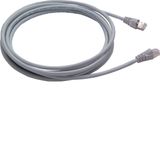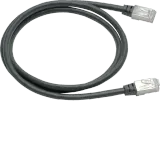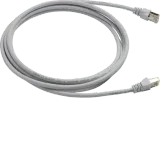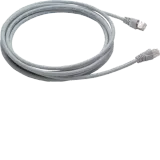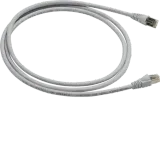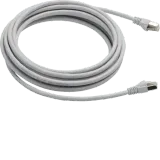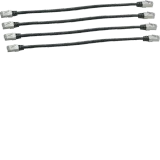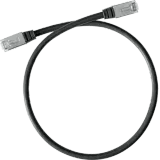Hager Telecommunication cables and wires
Hager data cables are designed for LAN and structured cabling systems where installers demand both mechanical strength and signal integrity. Most models comply with Category 5e, 6, or 6A, supporting data rates up to 10 Gbit/s over 100 metres. The conductors are solid bare copper 23–24 AWG, twisted with precise lay lengths to minimise crosstalk.
The outer sheath options — PVC, LSZH (Low Smoke Zero Halogen), or PE — cover every environment. LSZH is now standard in public buildings, as it limits smoke and toxic gas emissions during a fire. For outdoor runs or ducts, UV-stabilised PE sheaths resist sunlight and moisture.
From practice, installers prefer Hager’s meter-marked sheath and consistent twist rate: the cable pulls smoothly, pairs stay uniform, and terminations test cleanly on the first try. That reliability reduces rework — a hidden but real saving in bulk installations.
Hager Fibre Optic Cables – Long-Distance and High-Density Links
Where copper reaches its limits, Hager fibre optic cables take over. Available in single-mode (OS2) and multi-mode (OM3, OM4) variants, they support backbone connections and building interlinks up to 10 km without signal boosters.
Typical attenuation values are <0.35 dB/km at 1310 nm and <0.25 dB/km at 1550 nm, well within telecom standards. Cables include tight-buffered or loose-tube constructions with aramid yarn reinforcement for tensile loads up to 1000 N. Outer jackets are halogen-free and rodent-resistant for underground or riser installation.
For procurement managers, stocking both OS2 and OM3 types covers 90 % of integration tasks — OS2 for long distance, OM3 for high bandwidth inside buildings.
Hager Coaxial Cables – Video and Signal Reliability
For CCTV and broadcast systems, Hager coaxial cables combine a pure copper core with double shielding — aluminium foil plus tinned copper braid giving >85 % coverage. Typical impedance is 75 Ω, with attenuation around 18 dB per 100 m at 100 MHz. These values ensure crisp image transmission even across long camera runs.
Durable outer sheaths tolerate bending radius as low as 7× diameter, making them easy to route through tight trays or conduits. Matching BNC connectors and compression fittings in Hager’s communication accessory line guarantee impedance stability at every junction.
Hager Telecom and Communication Accessories
No installation ends with the cable alone. Hager’s communication accessories — patch panels, connectors, cable glands, wall outlets, and strain-relief clamps — are dimensionally matched to their cables. This consistency means you can crimp, terminate, or mount without mismatched tolerances that often plague mixed brands.
Pre-labelled modules and colour coding follow TIA/EIA 568 conventions, simplifying QA checks and on-site testing. For large projects, these small details save hours of post-installation verification.
Practical Notes for Procurement Teams
When sourcing telecommunication cables and accessories in bulk:
- Match category and bandwidth to project scope — Cat5e for legacy, Cat6A for modern offices.
- Check fire-safety compliance — LSZH or halogen-free is mandatory in public or enclosed areas.
- Plan stock ratios — about 60 % data/Ethernet, 25 % coaxial, 15 % fibre optic is typical for mixed installations.
- Standardise connectors — using the same brand eliminates loss from mismatched impedance or dimensions.
- Confirm packaging format — 305 m boxes for LAN cable, 500–1000 m drums for backbone or coax
Procurement experience shows that unified cabling and accessories under one manufacturer can cut project lead time by up to 20 %, mostly by avoiding compatibility issues and re-testing delays
Why Hager Telecommunication Cables Are a Practical Choice
Each Hager cable type is fully tested for signal attenuation, shielding efficiency, and mechanical integrity. The copper purity, insulation uniformity, and batch traceability all meet IEC 61156 and ISO/IEC 11801 standards. That gives distributors and contractors the confidence that every reel performs the same way — crucial when you deploy thousands of metres per site.
Bank of Lamps – Wholesale Supply
Bank of Lamps supplies the full Hager telecommunication range — Ethernet, data, fibre optic, and coaxial cables, along with matching connectors and accessories — directly from its central warehouse in Latvia. We handle project-based and wholesale orders with flexible reel sizes and traceable batches. Our logistics network serves the UK, Germany, Netherlands, Baltic states, France, Spain, and Belgium, ensuring fast, consistent delivery for European electrical and data infrastructure projects.
